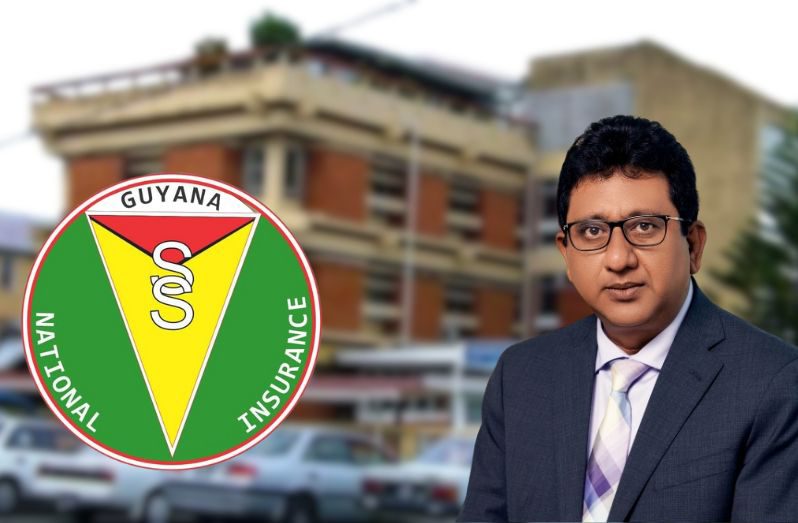ATTORNEY-GENERAL (AG) and Minister of Legal Affairs, Anil Nandlall, has issued a strong warning to employers, reminding them that it is a criminal offence to withhold National Insurance Scheme (NIS) contributions from employees without remitting them to the NIS.
During the recent episode of his weekly show, ‘Issues in the News,’ Attorney-General and Minister of Legal Affairs, Anil Nandlall, raised this issue while addressing circulating reports regarding an appeal filed by NIS against a High Court decision.
In that decision, High Court Judge Damone Younge ordered the NIS to pay a pension to Sharif Zainul, a former employee of Toolsie Persaud Limited (TPL)
Nandlall explained that the appeal was not initiated by the Attorney General’s Chambers but by the NIS itself, shedding light on critical aspects of the case.
“No such appeal was filed by the Attorney General’s Chambers. An appeal has been filed, but it has been filed by the National Insurance Scheme.”
He underscored the distinction, stating that the NIS, being a statutory body, can independently engage in legal proceedings without the involvement of the Attorney General.
The focal point of the appeal, as explained by Nandlall, revolves around the failure to include Toolsie Persaud Limited, the employer of Zainul, as a party in the original proceedings.
Zainul, through his legal representatives, solely sued the NIS, neglecting to include his employer.
He highlighted the crucial issue at hand: Toolsie Persaud Limited was not made a party to the proceedings, and the appeal seeks to address this omission.
“The NIS records show that no remissions were made by the employer to the NIS. The gentleman apparently had records that were produced to the court to establish that deductions were made from his wages or salaries.
“However, the NIS records do not establish that those deductions were actually paid over to NIS, and that is the problem with the case. Because we know, you know that there are many employers who are actually deducting NIS payments from employees,” he said.
As such, the AG warned that deducting NIS payments from employees but failing to remit those payments to the NIS constitutes a criminal offence under the law.
The appeal aims to determine the liability of the NIS when employees, in this case, Zainul, sue the scheme without including their employers in the proceedings.
The AG raised a crucial concern about the potential repercussions of allowing such decisions to go unchallenged.
“If this decision is allowed to go unchallenged, then it will open a floodgate when everyone will now sue the NIS and not their employers, and NIS will have to pay,” he cautioned.
Nandlall highlighted the risk of bankrupting the NIS if it is compelled to pay out funds it never received for and on behalf of employees.
“The appeal is intended to ventilate that particular point: should NIS pay when NIS did not receive the money, or if NIS is ordered to pay, then NIS will have to go after the employers who have received the money, but never transmitted or passed it over to the National Insurance Scheme,” he said.
Last November, Justice Younge directed the NIS to credit Zainul with 354 contributions that TPL failed to remit to NIS for the period of his employment from 1992 to 2000.
Additionally, NIS is required to disburse Zainul’s NIS pension from October 16, 2011, to the date of his 60th birthday.
The judge in her ruling said that the applicant should not bear the consequences of NIS and TPL’s failure to maintain accurate records or reconcile contributions.
Court documents reveal that Zainul’s quest for a pension was initially denied by the NIS, claiming insufficient contributions.
Despite providing evidence of his employment and NIS deductions from pay slips and testimonials, the Appeal Tribunal upheld NIS’s decision.
Subsequently, Zainul sought legal representation from attorney Christopher Thompson to pursue the matter in court.
Justice Younge ruled that contribution schedules should not override later documents when determining an insured person’s entitlement to pension benefits.
Recognising Zainul’s efforts to provide proof of employment, the judge highlighted the significance of testimonials from TPL’s former Personnel Officer, Krishendatt Sahadeo, and former employees Surujpaul Danpaul and Kenneth Gordon.
As such, Justice Younge ordered the NIS to pay Zainul’s pension with interest on arrears at a rate of six per cent per annum from October 16, 2011, to November 27, 2023. The interest rate will subsequently decrease to four per cent per annum until fully paid.
The court specified that any payment received by Zainul must be deducted from the arrears of his pension. The NIS was also required to cover GY$150,000 in costs.




.jpg)









